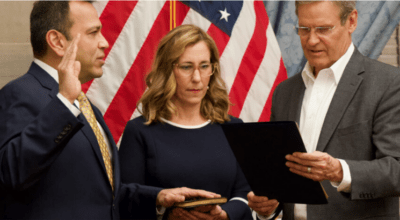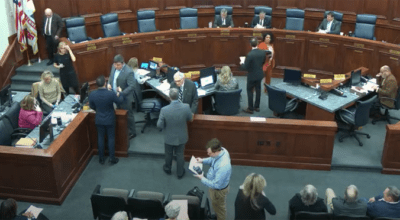
NASHVILLE, Tenn., Jan 31, 2023 — The Tennessee Department of Children’s Services is seeking an immediate infusion of $26.6 million from the state legislature to address a crisis in care that has left kids sleeping on office floors and in hospital beds because there are no other places for them.
By Anita Wadhwani / Tennessee Lookout
In making the ask on Monday before the House Finance, Ways, and Means Committee, DCS Commissioner Margie Quin said that every night between three and 30 kids in Tennessee are sleeping in makeshift settings, a problem chronicled in media reports for more than a year and highlighted last month in a scathing audit by the Comptroller, which concluded DCS was placing some children in harm’s way.
“Your support will mean an immediate reduction of children in state offices and stabilization of the provider network,” Quin said Monday.
The department’s emergency request — which is in addition to their annual request for an increase in next year’s budget — includes $20.4 million to provide a pay boost to private facilities in Tennessee that provide mental health, substance abuse and other care. The funds would open up 118 beds for kids, Quin said. Many of the children sleeping in offices are there because they require specialized care, but DCS has traditionally paid those facilities far less than other states.
“By increasing the provider rate, Tennessee is able to compete in the market with other states who are paying more per day, per bed than we are, as much as $100 per day,” Quin said, adding those beds would reduce the time youth spend in offices and transitional homes.
Commissioner Margie Quin told lawmakers a $26.6 million infusion into the Department of Children’s Services will help place children currently sleeping in makeshift settings, but the money won’t include a raise for caseworkers, an ongoing concern of legislators.
Currently 170 Tennessee children taken into DCS custody have been sent to out of state treatment facilities, because the state cannot afford to pay in-state providers the same rate they are getting from other states’ child welfare departments.
The funding request also includes $4.1 million to create 48 new “assessment beds” at private agencies that currently contract with DCS. Clinical assessments of kids coming into custody would help DCS correctly identify where those kids should be placed, she said.
And the department is hoping to boost foster care payments for families that take in some of the hardest-to-place kids: teens and large sibling groups.
Currently, Quin told lawmakers, teens coming into state custody have to wait an average of 22 days before DCS can place them — typically staying in state offices or in transitional homes.
Quin told lawmakers $1.2 million could bring 400 more of these harder-to-place kids into foster care, boosting foster care payments from $29 or $30 per day to $50 per day, with a $2,000 bonus after six months.
“I’m not going to sit here and tell you this is going to fix it,” Quin said. “I will know more in six to nine months. I don’t think this is going to fix the problem, but I think this is going to move the needle.”
We passed legislation in the last session to enhance caregiver, relative caregiver, to enable grandparents, uncles, aunts, whatever to take care of a child. As you continue to look at ways to get that placement time down, 22 days is a long time for a child to be just swinging in the wind.
– Rep. Patsy Hazlewood, R-Signal Mountain
The request does not increase pay for relatives who step forward to take in kids removed from their homes, something that concerned Rep. Sam McKenzie, a Knoxville Democrat. Lawmakers expanded the ability of relatives to care for kids and foster kids with state aid last year.
“You say you struggle with our children who are in this position and predicament. having someone close to the family who, with a few dollars, might actually be able to take these children or these groups of children in would be an asset,” he said. “Just expanding that great program recently passed by the last assembly would be something to consider.”
Quin’s request also includes no increase in pay for caseworkers.
That also concerned some lawmakers.
“My understanding was something different,” said Rep. Patsy Hazlewood, R-Signal Mountain, who chairs the committee. Hazlewood told Quin that there was a “real concern” among lawmakers about raising caseworker pay, given the last reports they received of 600 caseworker vacancies.
“I would just ask that the department to give some serious thought to Rep. McKenzie’s comments,” she said in drawing the meeting to a close. “We passed legislation in the last session to enhance caregiver, relative caregiver, to enable grandparents, uncles, aunts, whatever to take care of a child. As you continue to look at ways to get that placement time down, 22 days is a long time for a child to be just swinging in the wind.”


The state should have no function in handling these kids. But you say that is uncaring! If you really care, pick one of these kids and help them yourself. You would not be the first to do so.
What is happening is the state is taking your money to fund an army of people, call them caregivers, and milk you for all they can. Then if you were a party that wanted to abuse these kids in some way, why go to the kid down the street when you can use the state to harvest them en masse for you?
If you want to build a sex slave empire, this is fertile ground. Love does not come from the state. It is from one person directly to another.